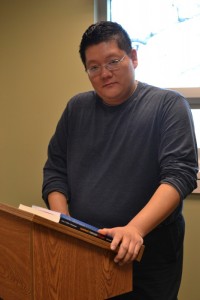Discrimination against minorities in Canada is something that is echoed on the country’s postsecondary campuses. Luckily, the Camosun Social Justice Club has emerged to combat these issues, and in doing so has created a space where students can safely tell their stories on campus.
The Social Justice Club holds a community roundtable meeting every other Tuesday in room 132 of the Alan Batey Library and Learning Commons at the Lansdowne campus. There, a group of students meet, share their experiences, and discuss problems happening on campus.
Camosun student and staffperson Andy Chen is at the forefront of this new club. For Chen, social justice encompasses issues of inequality, and with this new club he hopes to bring these issues to light.

“The definition seems to change all the time,” says Chen. “For me, social justice is raising awareness about issues that disproportionately affect members of society, and it’s pretty broad. It includes, but is not limited to, racism, sexism, ageism, ableism, homophobia, transphobia, and classism.”
Chen has heard firsthand the struggles of students on campus. Working in the English Language Development department, he has listened to countless stories of struggles that new immigrants and citizens have gone through.
“I started hearing more stories of adversity, and it actually started to mean something,” says Chen. “We have students there who’ve experienced torture and imprisonment. They were fleeing their country and coming to Canada because it’s a safe haven.”
But even Canada still lacks the equality it desperately needs. In October, government cuts to funding on postsecondary ESL programs ignited a desire for justice in Chen.
“They’re experiencing a different kind of oppression,” says Chen about ESL students. “Where they’re being taught about equality, and human rights, at the same time our systems are denying them access to services we take for granted, like English language training.”
Chen says we need to hear these stories. According to him, Western media doesn’t adequately represent these visible minorities in society. His hope is that the Social Justice Club can help others shed light on these issues.
“We never seem to get a full picture,” says Chen. “Personal stories broaden that narrative.”
But finding people who wish to speak up about discrimination can be hard.
“A lot of people just don’t want to talk about it,” explains Chen, “or feel they don’t know enough to engage someone in that discussion.”
But some students are speaking up. One student says her experiences in the club have been positive so far and that she appreciates the space.
“It’s a safe place,” says Sula Brown, “to edify our minds with the freedom to release the greater voice within.”
